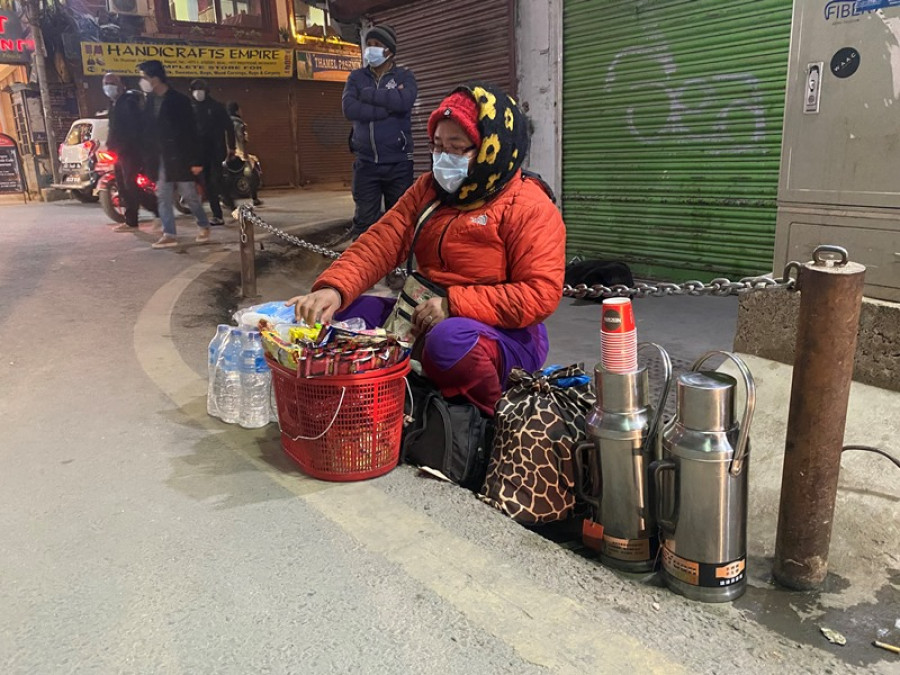Culture & Lifestyle
Street vendors are struggling to make ends meet despite life limping back to normal
Covid-19 restrictions ground Thamel’s thriving nightlife to a standstill, shutting many businesses, but perhaps the squeeze was mostly felt by night street vendors.
Tsering Ngodup Lama
At a few minutes past 7 pm on a recent Friday evening in Thamel, Sonu Lama, a night street vendor, was in her usual spot—on the side of the road in front of a high-end Italian restaurant.
Placed in front of 47-year-old Lama were her wares for sale—a red basket filled to the brim with biscuits, juices, cigarettes, and chewing tobacco. To her left were two large thermoses filled with tea (black and milk) and to her right was a carton of mineral water bottles, and on the top of the carton was a packet of disposable masks. Inside a loose pouch around her neck was a stack of phone recharge cards.
For years, night street vendors like Lama have been a fixture of Thamel’s nightlife scene, selling partygoers and those who work late in the area tea, biscuits, cigarettes, and the earnings from the profession have allowed many like Lama to put food on the table, pay rent and children’s school fees. But then the pandemic hit and Thamel’s nightlife came to a complete halt for months, leaving street vendors without a steady source of income. In December last year, pubs and bars in Thamel started operating and night street vendors returned. It’s been nearly two months now, but footfall in Thamel, say vendors, has yet to pick up and business is no longer the same.
Before Lama became a night street vendor in Thamel, she worked as a housekeeping staff at hotels in Thamel.
“I spent almost seven years of my life working as a housekeeping staff at two hotels in Thamel,” said Lama. “At the first hotel, I worked for more than three years. I had to quit because I had to go back to my village in Sarlahi to get some paperwork done and my employer refused to give me enough days off.”
At her second workplace, says Lama, she kept falling unwell.
“Despite that, I worked for nearly three years until I couldn’t take it anymore and I quit,” said Lama. “After that, I did apply for a job as a housekeeping staff at hotels but all the places that I applied to told me they were only hiring young people and those who could communicate in English. I didn’t fit the bill.”
But her bills, says Lama, a single mother and the sole provider to her son, still had to be paid.
Lama pooled together Rs 5,000, enough startup capital to start working as a night street vendor. That was more than four years ago.
Lama estimates that there are dozens like her in Thamel who make a living as a night street vendor.
One of them is 68-year-old Krishna Maya Pathak. Her spot is Thamel’s Narsingh Chowk. Until two years ago, Pathak was a housewife. Her husband, a rickshaw driver, was the sole breadwinner in the family and for years the Pathaks got by on his earnings, however meagre.
“We never had enough,” said Pathak. “That’s why two years ago, I decided to work so I too can bring in some money home.”
But finding work at her age, says Pathak, wasn’t easy.
“And that’s how I started as a night street vendor. The work suits me because it’s not very physically demanding. The only downside is having to stay up all night but I have gotten used to it now,” said Pathak. “The money I earn as a night street vendor has helped ease a lot of financial problems our family was mired in.”
But since last year’s March, which was when Nepal went into a lockdown, business, say vendors, has taken a huge hit.
“Before the pandemic, on weekends, I’d make around Rs 1,200 to 1,500 profit and during the weekdays, I’d make around Rs 400 to 500,” said Lama. “For me, the money was enough to pay my rent and take care of my son’s needs.”
But 2020, says Lama, was extremely tough.
“I didn’t work for seven months because the clubs, pubs, bars in Thamel were all closed and there was no nightlife to speak of,” said Lama. “There was no point going there to sell my goods. I had no option but to dip into my little savings.”
In November, as businesses in Thamel started opening, Lama too returned.
“But the number of people coming to Thamel in the evening has drastically reduced and that has had a direct impact on our business,” said Lama. “To make up for lost revenue, I now come to Thamel around 2pm every day instead of 7pm. Despite that, it’s challenging to make even around Rs 300 profit a day these days.”
Another challenge they have had to deal with for the past few days, says street vendors, is police officers not allowing them to operate in Thamel’s core areas.
“For the last few days, police officers have been clamping down on street vendors. By 8pm, which is when business for us vendors starts picking up, they start chasing us away from our spots,” said Pathak.
The other day, says Lama, after being constantly chased away by police officers, she was unable to even sell a thermos of milk tea.
“To make one large thermos of milk tea, I use one and a half litre of milk, which costs Rs 120 and add to that the cost of sugar, tea and fuel. All of it went down the drain,” said Lama. “To many, the money may not be much but for me, the profit I make from selling one thermos of tea allows me to buy vegetables for a few days.”
Lama says she is aware that what she does for a living is not legal.
“Nobody would choose to stay up all night and sell goods on the streetside. Like many who work as street vendors, I do this because I have no other choice,” said Lama. “The last few months have already been so difficult for many of us. I have been unable to pay my rent on time and my landlord threatens to evict me. And every day I leave home with my wares and hope that today it will be better but so far things haven’t been better.”




 9.33°C Kathmandu
9.33°C Kathmandu















